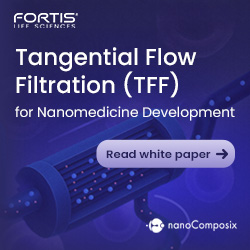Corbus Pharmaceuticals Licenses Two Integrin Targeting mAbs Further Expanding Pipeline Into Cancer & Fibrotic Diseases
Corbus Pharmaceuticals Holdings, Inc. recently announced licensing deals for two new monoclonal antibodies (mAbs), CRB-601 and CRB-602, that target integrins to inhibit activation of transforming growth factor β (TGFβ). This new integrin program, in addition to the existing endocannabinoid system program, strengthens and diversifies Corbus’ immunology pipeline for inflammatory, fibrotic, and metabolic diseases, and cancer. With these additions, Corbus expects to have four compounds other than lenabasum in Phase 1 testing in 2022.
TGFβ is a multifunctional cytokine involved in many cellular processes, including cell growth and differentiation, immune responses, wound healing, and tissue repair. TGFβ plays a key role in fibrosis and also promotes cancer growth and metastasis via its effects in the tumor microenvironment (TME). The integrins αvβ6 and αvβ8 are expressed by cancer cells, and αvβ6 is also expressed on epithelial cells in fibrotic diseases. These integrins enable TGFβ to exert its biologic effects by releasing it from its latent complex. The goal of blocking these integrins is to inhibit the deleterious effects of TGFβ. A number of other preclinical and early clinical stage programs are testing this approach of inhibiting αv integrins.
CRB-601 and CRB-602 are two novel and distinct anti-integrin mAbs:
- CRB-601 is an anti-αvβ8 mAb rationally designed by Dr. Stephen Nishimura and his colleagues at the University of California San Francisco and is potent at picomolar concentrations in inhibiting activation of TGFβ. C6D4, the parent mAb of CRB-601, has single agent activity as well as synergistic activity when combined with an anti-PD1 mAb in syngeneic mouse tumor models. Corbus plans to develop CRB-601 for treatment of solid tumors in combination with existing therapies, including checkpoint inhibitors. Phase 1 studies are expected to start in 2022.
- CRB-602 was developed by Panorama Research Inc. to specifically inhibit both αvβ6 and αvβ8. Both αvβ6 and αvβ8 have been implicated in fibrotic diseases and in cancers of epithelial cell origin. Corbus believes targeting both integrins at once is a rational approach to treating fibrotic diseases and carcinomas. Phase 1 studies are expected to start in 2022.
“We look forward to a strong partnership with Corbus and hope to see our mAb make a positive impact on the lives of cancer patients all over the world,” said Anthony Francis, Executive Director of Technology Management at UCSF Innovation Ventures.
“Corbus is committed to developing new medicines to improve the lives of people who need them,” stated Yuval Cohen, PhD, Chief Executive Officer. “We believe these two new integrin-targeting mAbs offer a promising approach to inhibiting TGFβ, fit well with our expertise in immunology, and diversify and expand our pipeline. We plan to advance up to four new programs into the clinic next year and have the capital and resources to do so.”
The Company’s $125 million of cash and investments on hand, as of March 31, 2021, is expected to fund operations into the first quarter of 2024, based on the current planned expenditures.
Under the combined terms of the two exclusive licensing agreements, Corbus will pay $2 million upfront and will make potential development and sales milestone payments totaling up to $206 million and pay low single-digit royalties on sales.
The University of California, San Francisco (UCSF) is exclusively focused on the health sciences and is dedicated to promoting health worldwide through advanced biomedical research, graduate-level education in the life sciences and health professions, and excellence in patient care. It includes UCSF Health, which comprises three top-ranked hospitals, as well as affiliations throughout the Bay Area. Learn more at ucsf.edu, or see our Fact Sheet.
Panorama Research Inc. is a translational research lab and incubator with deep domain expertise in antibody engineering and preclinical drug development. Panorama focuses on identifying promising therapeutic targets and incubates novel, proprietary technologies from in-house research or through collaboration with leading academic institutions. Panorama is headquartered in Sunnyvale, CA.
Corbus is committed to leveraging our expertise in immunology to fulfill our purpose of developing innovative new medicines that improve the lives of people living with inflammatory, fibrotic, and metabolic diseases, and cancer. Corbus’ current pipeline includes small molecules that activate or inhibit the endocannabinoid system and anti-integrin monoclonal antibodies that block activation of TGFβ. Corbus is headquartered in Norwood, Massachusetts. For more information on Corbus, visit corbuspharma.com. Connect with us on Twitter, LinkedIn and Facebook.
Total Page Views: 1577









